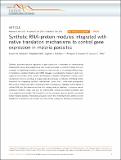| dc.contributor.author | Ganesan, Suresh Maddur | |
| dc.contributor.author | Falla Castillo, Diana Alejandra | |
| dc.contributor.author | Goldfless, Stephen Jacob | |
| dc.contributor.author | Nasamu, Armiyaw Sebastian | |
| dc.contributor.author | Niles, Jacquin C. | |
| dc.date.accessioned | 2016-08-30T15:50:11Z | |
| dc.date.available | 2016-08-30T15:50:11Z | |
| dc.date.issued | 2016-03 | |
| dc.date.submitted | 2015-03 | |
| dc.identifier.issn | 2041-1723 | |
| dc.identifier.uri | http://hdl.handle.net/1721.1/104064 | |
| dc.description.abstract | Synthetic posttranscriptional regulation of gene expression is important for understanding fundamental biology and programming new cellular processes in synthetic biology. Previous strategies for regulating translation in eukaryotes have focused on disrupting individual steps in translation, including initiation and mRNA cleavage. In emphasizing modularity and cross-organism functionality, these systems are designed to operate orthogonally to native control mechanisms. Here we introduce a broadly applicable strategy for robustly controlling protein translation by integrating synthetic translational control via a small-molecule-regulated RNA–protein module with native mechanisms that simultaneously regulate multiple facets of cellular RNA fate. We demonstrate that this strategy reduces ‘leakiness’ to improve overall expression dynamic range, and can be implemented without sacrificing modularity and cross-organism functionality. We illustrate this in Saccharomyces cerevisae and the non-model human malarial parasite, Plasmodium falciparum. Given the limited functional genetics toolkit available for P. falciparum, we establish the utility of this strategy for defining essential genes. | en_US |
| dc.description.sponsorship | Massachusetts Institute of Technology (MIT startup funds) | en_US |
| dc.description.sponsorship | Thomas and Stacey Siebel Foundation (Award) | en_US |
| dc.description.sponsorship | National Institute of General Medical Sciences (U.S.) (Center for Integrative Synthetic Biology Grant (P50 GM098792)) | en_US |
| dc.description.sponsorship | National Institute of Environmental Health Sciences (Predoctoral Training Grant (5-T32-ES007020)) | en_US |
| dc.description.sponsorship | Bill & Melinda Gates Foundation (Grand Challenges Explorations initiative (OPP1069759)) | en_US |
| dc.description.sponsorship | National Institutes of Health (U.S.) (NIH Director’s New Innovator Award (1DP2OD007124)) | en_US |
| dc.language.iso | en_US | |
| dc.publisher | Springer Nature | en_US |
| dc.relation.isversionof | http://dx.doi.org/10.1038/ncomms10727 | en_US |
| dc.rights | Creative Commons Attribution | en_US |
| dc.rights.uri | http://creativecommons.org/licenses/by/4.0/ | en_US |
| dc.source | Nature Publishing Group | en_US |
| dc.title | Synthetic RNA–protein modules integrated with native translation mechanisms to control gene expression in malaria parasites | en_US |
| dc.type | Article | en_US |
| dc.identifier.citation | Ganesan, Suresh M., Alejandra Falla, Stephen J. Goldfless, Armiyaw S. Nasamu, and Jacquin C. Niles. "Synthetic RNA-protein modules integrated with native translation mechanisms to control gene expression in malaria parasites." Nature Communications 7, Article number: 10727 (2016), pp.1-10. | en_US |
| dc.contributor.department | Massachusetts Institute of Technology. Department of Biological Engineering | en_US |
| dc.contributor.mitauthor | Ganesan, Suresh Maddur | en_US |
| dc.contributor.mitauthor | Falla Castillo, Diana Alejandra | en_US |
| dc.contributor.mitauthor | Goldfless, Stephen Jacob | en_US |
| dc.contributor.mitauthor | Nasamu, Armiyaw Sebastian | en_US |
| dc.contributor.mitauthor | Niles, Jacquin C. | en_US |
| dc.relation.journal | Nature Communications | en_US |
| dc.eprint.version | Final published version | en_US |
| dc.type.uri | http://purl.org/eprint/type/JournalArticle | en_US |
| eprint.status | http://purl.org/eprint/status/PeerReviewed | en_US |
| dspace.embargo.terms | N | en_US |
| dc.identifier.orcid | https://orcid.org/0000-0001-5261-3835 | |
| dc.identifier.orcid | https://orcid.org/0000-0002-7779-2216 | |
| dc.identifier.orcid | https://orcid.org/0000-0003-1160-3969 | |
| dc.identifier.orcid | https://orcid.org/0000-0002-6250-8796 | |
| mit.license | OPEN_ACCESS_POLICY | en_US |
